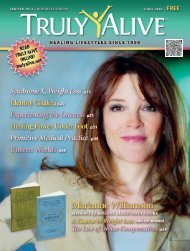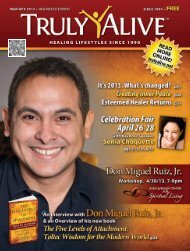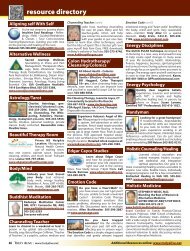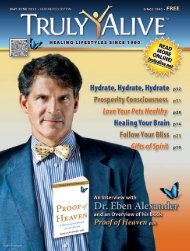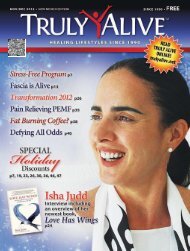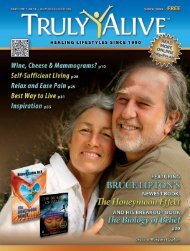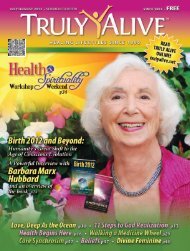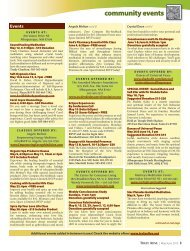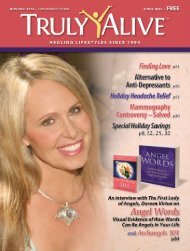Download - Truly Alive Magazine
Download - Truly Alive Magazine
Download - Truly Alive Magazine
You also want an ePaper? Increase the reach of your titles
YUMPU automatically turns print PDFs into web optimized ePapers that Google loves.
consciousness from the rest of the world.<br />
Professor Wheeler stated that the failure<br />
to find the unified field theory in physics<br />
is due to having written consciousness<br />
out of the equation.<br />
False assumption number 4 is also<br />
with regard to physics, and it says that<br />
the space between physical things is<br />
empty. We now know that there is no<br />
empty space. There are forms of energy<br />
that occupy all space. We’ve been led to<br />
believe that everything is separate from<br />
everything else, and what we do in one<br />
place has little or no impact on what<br />
happens somewhere else. Now we know<br />
that is not the case.<br />
The last false assumption is perhaps<br />
the most critical when it comes to the<br />
changes we are being asked to make in<br />
our world today. With regard to nature,<br />
Darwin stated in his book On the<br />
Origins of Species, that nature is based<br />
upon what is called “survival of the<br />
strongest.” Darwin was the first scientist<br />
to attempt to answer the big questions<br />
of the origins of life, beyond the realm<br />
of the religious community and the<br />
church. Because Darwin attempted to<br />
answer these questions through the<br />
emerging language of science, his ideas<br />
were quickly embraced with very little<br />
question, in the world at that time.<br />
People say to me, “OK, Gregg, maybe<br />
Darwin wasn’t quite right. And that<br />
was over 150 years ago. What difference<br />
could it possibly make in our modern<br />
sophisticated technological world<br />
today?” We live in the modern world of<br />
the 21st century; that is true. We have<br />
refined ideas, but the ideas were actually<br />
developed in the late 1800’s and early<br />
1900’s when Darwin’s ideas were very<br />
popular. Possibly the best example of<br />
the “Survival of the strongest” idea is<br />
our global economy. Corporations are<br />
based upon the idea of “Survival of the<br />
strongest.” Our young people in school<br />
more often than not are taught that it’s<br />
all about getting the right answer on the<br />
test, or about scoring the right point on<br />
the field. The underlying belief is, we live<br />
in the world that’s “dog eat dog”— a world<br />
of scarcity, a world of lack, where there is<br />
one pie and everyone must fight for their<br />
slice. The problem is, the best science of<br />
our time is telling us that nature is NOT<br />
based upon “Survival of the strongest.”<br />
While we may see expressions of that<br />
in nature, they are response-specific<br />
situations. The over-arching rule in<br />
nature is that it is based upon a model of<br />
cooperation and mutual aid.<br />
There are two primary kinds<br />
of competition: There is a form of<br />
competition where one person or one<br />
group benefits at the expense of another;<br />
where a group or an individual exploit<br />
the weaknesses of another. In nature,<br />
that’s called violent competition. There’s<br />
another form of competition, where a<br />
group or an individual excels simply<br />
because they have developed their<br />
abilities to their highest expression. Over<br />
four hundred studies were done in the<br />
last 15 years that asked the same question:<br />
what is the optimum amount of violent<br />
competition in the environment? What<br />
the studies found was, the optimum<br />
amount of violent competition in ANY<br />
situation is ZERO, in any environment<br />
—in the workplace, in the classroom, on<br />
the playing field. Competition always,<br />
always, always is detrimental to the<br />
individual and to the group. In 2008, the<br />
prestigious journal New Scientist did an<br />
essay encapsulating this work and the<br />
new discoveries, emphasizing that what<br />
we see in the wild is not every animal out<br />
for itself, and if cooperation were to break<br />
down, the results would be disastrous.<br />
These new discoveries tell us the<br />
bottom line is: we know that nature, the<br />
real nature, is based on cooperation and<br />
mutual aid, and that’s a very different<br />
way of going about solving our problem<br />
than competition and conflict. We are<br />
witnessing the expression…the extremes<br />
of these false assumptions, along with an<br />
opportunity to embrace the best science<br />
of our time. Can we marry that science<br />
with our most cherished spiritual and<br />
indigenous traditions to weave a new<br />
wisdom that is greater than anything<br />
that we have had in the past? This is the<br />
essence of the book Deep Truth.<br />
TA: You have journeyed to many<br />
archeological sites, because you believe<br />
the ancient past hold the keys to the<br />
future. In what way?<br />
GB: When I was in school, I was shown<br />
charts of the history of the world. They all<br />
said that our history began about 5,000<br />
years ago in ancient Sumeria. Now, what<br />
we are finding is this: there is a common<br />
theme that runs through the advanced<br />
civilizations of the world, prior to 5,000<br />
years ago. In every instance with the<br />
excavations, no evidence of war has been<br />
found; no evidence of the need to defend<br />
Gregg Braden playing an Andean flute<br />
homes and cities against intruders—no<br />
evidence of weapons, of walls, of moats.<br />
No evidence of mass graves (that you<br />
would expect at the end of large scale<br />
wars) were ever found; none of the<br />
mutilated bodies and severed limbs with<br />
axes in skulls (that you would expect<br />
to find after wars). As a scientist, I have<br />
to say one of two things is happening<br />
here: either 1) weapons exist, and they<br />
haven’t been found, or 2) they don’t<br />
exist because war is not human nature.<br />
A growing number of historians and<br />
anthropologists are beginning to write in<br />
their papers that war is an aberration of<br />
human experience. It’s a habit that began<br />
5,000 years ago with the first evidence of<br />
large scale war in the nation of Sumeria.<br />
If war is a habit that was learned 5,000<br />
years ago, the question is—can we<br />
unlearn that habit? Archaeology itself—<br />
the peer-reviewed science of civilization<br />
—is now confirming human nature is<br />
also based on a model of cooperation<br />
and mutual aid.<br />
TA: Why is it important for us to<br />
understand that the global economic<br />
collapse did not happen quickly or without<br />
notice?<br />
GB: I think <strong>Truly</strong> <strong>Alive</strong> readers are<br />
well-informed and know that this is no<br />
ordinary time in the history of the world.<br />
But for many people in the mainstream,<br />
it took people by surprise. In all honesty,<br />
so many people’s lives are so full with<br />
just trying to get through the day, trying<br />
to get their kids to school, keep dinner<br />
on the table, hold down their jobs, stay<br />
healthy and have some semblance of a<br />
social life; they just don’t spend a lot of<br />
time delving into the intricacies of what<br />
keeps our civilization on track. They<br />
trust the people in control. They trust the<br />
continued on p26<br />
<strong>Truly</strong> <strong>Alive</strong> | September/October 2012 25



